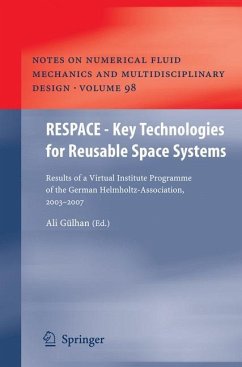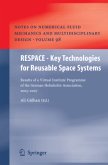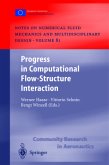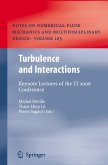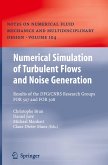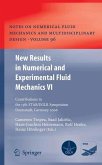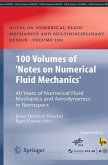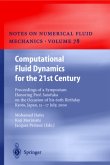This volume contains the main results of the three years study (2003 - 2007) of the Virtual Institute RESPACE (Key Technologies for Re-Usable Space Systems), consisting of three DLR departments and four institutes of the RWTH Aachen, the University of Stuttgart and the Technical University München. The nine topics treated with a multidisciplinary numerical and experimental approach are systems aspects of advanced space transportation vehicles, vehicle base flow, propulsion jet and external flow interaction, active cooling of hot structures, film cooling and its influence on boundary-layer flow.
A few years ago the Helmholtz Association (HGF) consisting of 15 research Institutions including the German Aerospace Center (DLR) started a network research program called 'Virtual Institutes'. The basic idea of this program was to establish research groups formed by Helmholtz research centers and universities to study and develop methods or technologies for future applications and educate young scientists. It should also enable and encourage the partners of this Virtual Institute after 3 years funding to continue their cooperation in other programs. Following this HGF request and chance the DLR Windtunnel Department of the Institute of Aerodynamics and Flow Technology took the initiative and established a network with other DLR institutes and German u- versities RWTH Aachen, University of Stuttgart and Technical University Munich. The main goal of this network was to share the experience in system analysis, ae- dynamics and material science for aerospace for improving the understanding and applicability of some key technologies for future reusable space transportation s- tems. Therefore, the virtual institute was named RESPACE (Key Technologies for Re- Usable Space Systems).
A few years ago the Helmholtz Association (HGF) consisting of 15 research Institutions including the German Aerospace Center (DLR) started a network research program called 'Virtual Institutes'. The basic idea of this program was to establish research groups formed by Helmholtz research centers and universities to study and develop methods or technologies for future applications and educate young scientists. It should also enable and encourage the partners of this Virtual Institute after 3 years funding to continue their cooperation in other programs. Following this HGF request and chance the DLR Windtunnel Department of the Institute of Aerodynamics and Flow Technology took the initiative and established a network with other DLR institutes and German u- versities RWTH Aachen, University of Stuttgart and Technical University Munich. The main goal of this network was to share the experience in system analysis, ae- dynamics and material science for aerospace for improving the understanding and applicability of some key technologies for future reusable space transportation s- tems. Therefore, the virtual institute was named RESPACE (Key Technologies for Re- Usable Space Systems).

